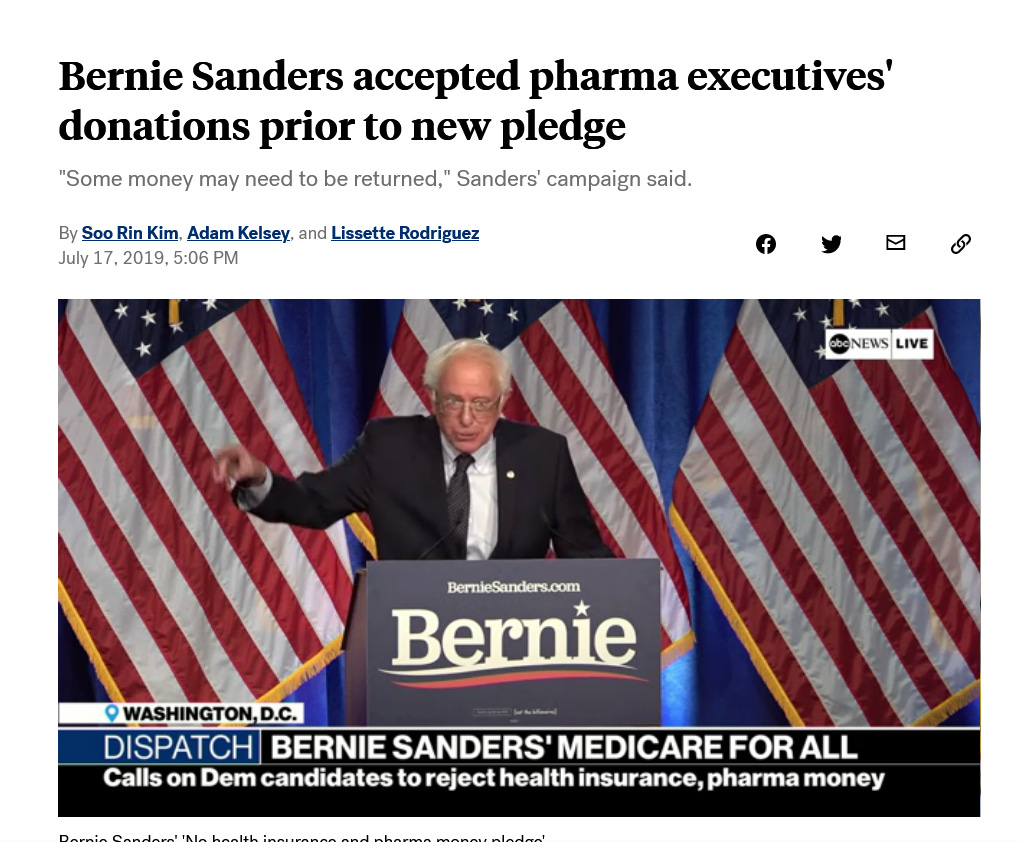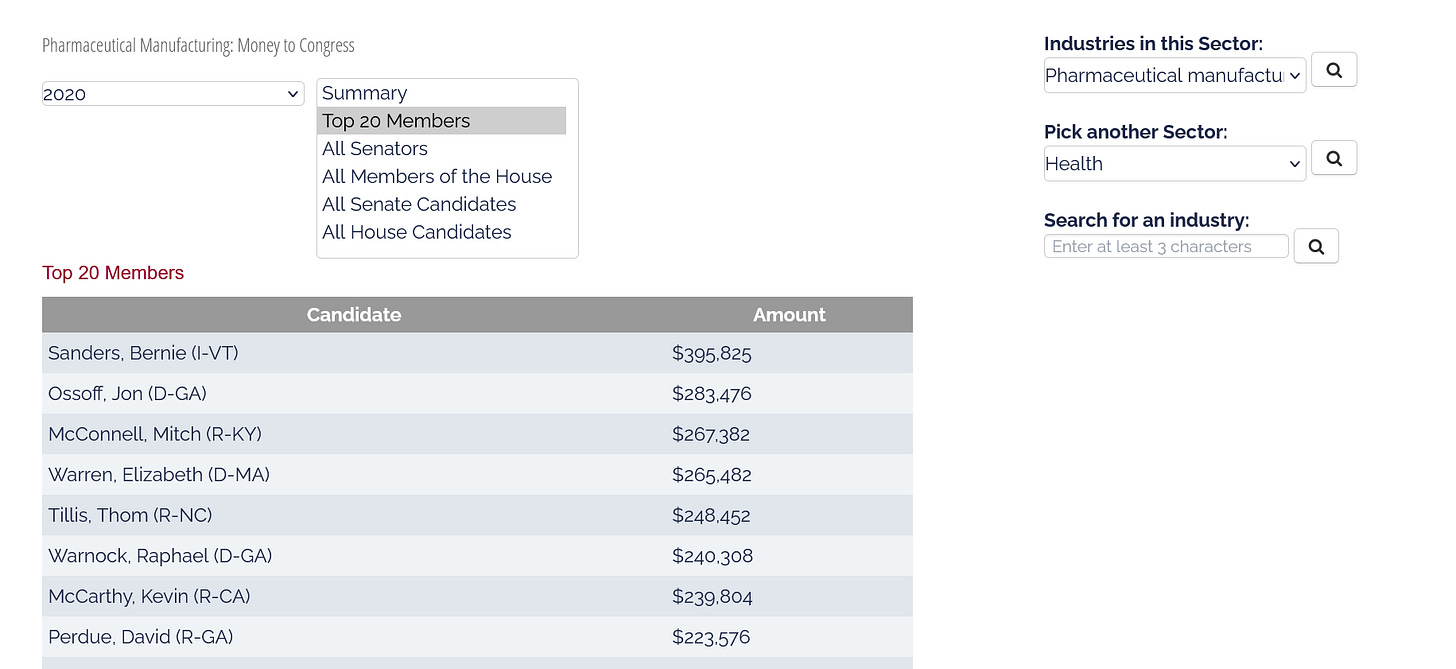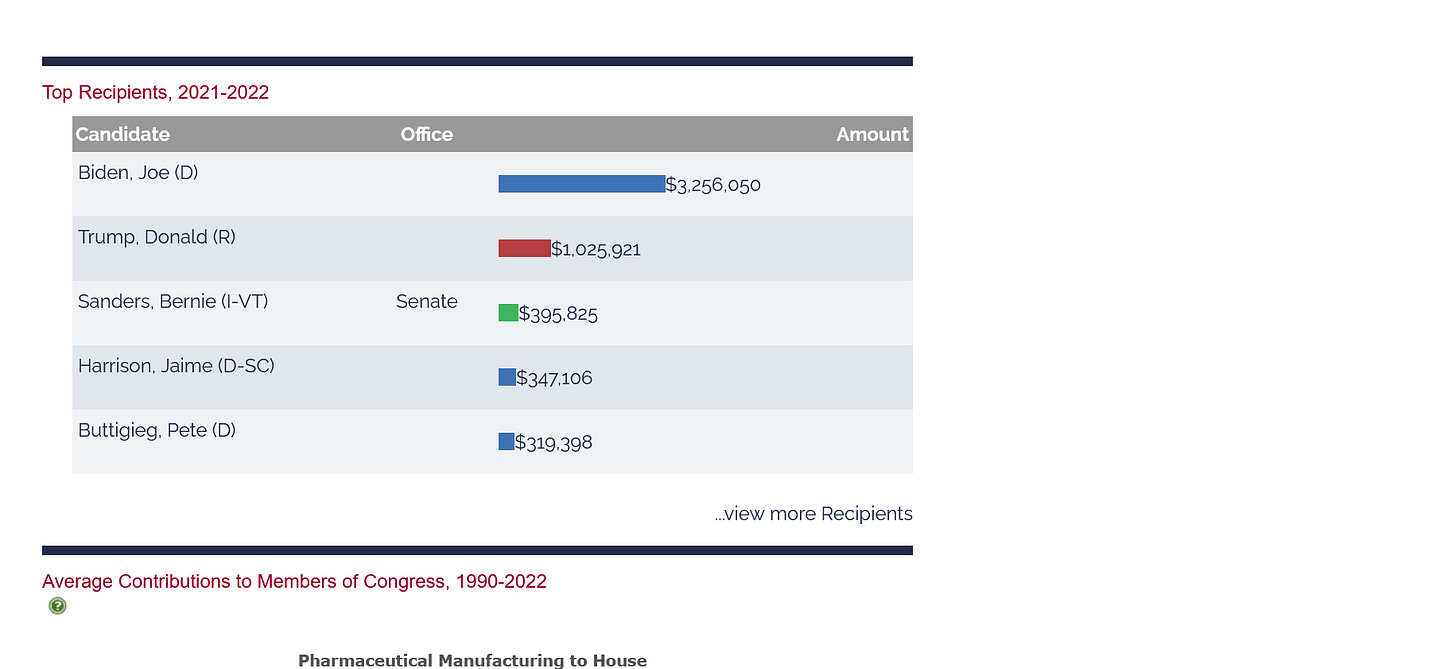“Bernie Sanders’ pharma money”—In the world that we’ve been shown, this phrase isn’t even supposed to exist. Senator Bernard Sanders of Vermont is the people’s tribune, the outsider who has a “long-standing commitment to the interests of the large majority of the population, not the top 0.1 percent” according to Noam Chomsky. But there it is, reported back in July 17, 2019 by ABC News.
After Sanders made a public challenge to his presidential rivals not to accept donations greater than $200 from pharmaceutical executives, journalists unearthed an awkward fact: Sanders had just taken donations exceeding $200 from Pfizer Vice President Lyn McRoy.
But when you do a little digging, it gets worse.
That was only Bernie’s presidential campaign. Sanders also ran for senate in 2020. In his Vermont senatorial campaign, Sanders took more Big Pharma money than anyone else in congress. That is to say, he took more direct drug company money in 2020 than any politician besides Donald Trump and Joe Biden. Bernie’s Pfizer connection, McRoy, doled out his payout in dribs ranging from $70 to $500, seemingly trying to make a large donor look like a small one. This calls into question the whole perception of small donors financing the majority of Sanders’ presidential campaign.
The Federal Election Commission (FEC) has recently put some MAGA Republican lawmakers under scrutiny for their unitemized donations, insinuating that they’re not as grassroots as they seem. There’s no documentation that these representatives’ small donations came from Fortune 500 executives though, whereas some of Sanders’ small donations clearly have. Outside of a few articles three years ago (and a now-buried dark money scandal) Bernie has evaded all scrutiny.
There was a time during the opioid crisis when Sanders denounced the murderous activities of pharma, including an entire townhall in 2018. But then how could he have ignored it and maintained his populist brand? As he noted at the time, opioids had killed more young Americans in 2017 than the Vietnam War had in a decade.
Speaking before anti-pharma activists, Sanders proclaimed “On the issue of why so many young people are turning to drugs, you probably know a lot more than the experts.” It was, after all, experts at the highest level who’d set up the crisis. In the 1970s, the World Health Organization declared “freedom from pain” to be a universal human right. In 1986, WHO claimed “the inadequate treatment of cancer and noncancer pain is a serious public health concern.” Soon top medical journals were publishing studies claiming that the new generation of opioids were non-addictive. The widespread influence of the American Pain Society “trained patients to be more sensitive to pain, effectively putting a monster under the bed” for drug makers to rescue us from, according to journalist and opioid survivor Ryan Hampton. “Pharmaceutical companies such as Purdue were major donors to the American Pain Society and other pain advocacy groups.”
But in 2020, Bernie had no second thoughts about establishment health experts. Thus when Anthony Fauci’s National Institute of Allergy and Infectious Diseases was found to have delivered a “10-fold mortality overestimation reported to Congress” on Covid-19, Sanders failed to sound the alarm—or even call for truth and accountability after the fact. One would think that Sanders would at least join with other leading Democrats in cautioning about the rushed “Trump vaccine,” but apparently his dealings with Big Pharma precluded that.
Through most of his career, “revolutionary” Bernie’s critique of the medical establishment has been focused on drug prices. This is an idea so un-revolutionary it’s been voiced by everyone from John McCain to Amy Klobochar to Donald Trump, who famously said that pharma was “getting away with murder” on profiteering. In a deep discussion on drug companies in 2019, Bernie made it clear that prices were his focus, and he took pains to praise corporate researchers, particularly those working on Alzheimer’s drugs. The problem is that Alzheimer’s treatment is known to be a deceptive enterprise, just like most drug research. Months after this interview, a “breakthrough” Alzheimer’s product called Aduhelm was rammed through the FDA via collusion between the manufacturer and the federal agency. Not one of the FDA’s scientific advisers endorsed the treatment—yet officials approved it anyway, and three advisers resigned in outrage. Two years later, with nearly half of Aduhelm users suffering from brain swelling or bleeding, the treatment is on its way to being recalled. Sanders has decried the high price of the drug, but said nothing about the rot at the center of the medical establishment that allowed Aduhelm to “pass” clinical trials in the first place.
The number of people killed by prescription drugs each year surpasses the number killed due to lack of health insurance. Liberal think tanks have focused on the latter and not the former because they are increasingly funded by interests that profit off those deadly drugs. The closest that such institutions have come to criticizing over-prescription was when Public Citizen led the crusade against off-label marketing of pharma products during the Obama administration (which led to Pfizer getting the largest corporate fine in history). But some of pharma’s biggest body counts have resulted not from off-label use, but on-label use of its products—as with the genesis of the opioid crisis. In 2013, medical professor Donald Light told US World and News Reports that “By far the greatest number of [prescription drug-related] hospitalizations and deaths occur from drugs that are prescribed properly by physicians and taken as directed.”
Pfizercare For All?
It’s now been 10 years since Professor Light published his landmark study showing that prescription drugs were the fourth leading cause of death in the US. You can see the paper cited favorably on the Harvard and FDA websites, but virtually no notice in media or from the progressive activist world. Instead there’s been a surprising mainstreaming of the idea of single-payer “Medicare For All” health insurance in the US, which had previously been considered taboo. This may be because expanded state insurance is no threat to pharma profits, but a potential boon. Drug companies spend over a billion dollars on philanthropy each year to expand low-income patients’ access to drugs through non-profit insurance programs. Even notorious “pharma bro” Martin Shkreli used co-pay foundation programs, leveraging Medicare purchases to stimulate demand for his criminally overpriced drugs. In 2019, the US Department of Justice accused seven companies of conspiring to “pay kickbacks” through medical charities so their drugs could be purchased by Medicare. The foundations and companies settled out of court for $17 million, a fraction of the profits made through the scheme, and cold comfort to those patients who’d had unnecessary drugs foisted on them.
These pharma-funded Medicare kickbacks lead directly to patients being misdiagnosed and mistreated for profit. When Connecticut Attorney General Richard Blumenthal made his initial complaint to Purdue Pharma, he noted “the astonishing growth in state funding” that was being used to pay for OxyContin prescriptions through Medicare and Medicaid. Dr. Allen Frances, formerly Chair of Psychiatry at Duke University, holds Medicare partly responsible for the opioid crisis:
Our US Medicare system has fallen into Pharma’s trap. It has mindlessly funded a fantastic giveaway to the profit hungry drug companies, without considering the dire health impact on its beneficiaries and without attempting to discipline the careless prescribing habits of the doctors it has been subsidizing.
The medical scholar Peter Gotzche has repeatedly compared Big Pharma to organized crime and states that “When crime pays, there will be more crime.” It’s time to ask if blindly expanding Medicare, a program that pays the criminals, is going to save lives or cost them. What good is preventing the 68,000 deaths that are estimated to result from lack of health insurance if we are expanding on the 120,000 deaths that are caused by prescription drugs? 120,000 may be an underestimate—Dr. Gotzche believes the death toll to be 200,000 a year, making prescription drugs the third leading cause of death in the US, not the fourth.
There are socialized medical programs in the world that have been net positives to their communities, Britain’s National Health Service being the most obvious example. But the NHS, along with the rest of the UK welfare state, was founded by an ex-coalminer operating within a strong and authentic Labour Party. This historic centering of working people over bureaucracy and corporate profit is one reason Britain was ultimately able to avoid Covid vaccine mandates—even in its nationalized healthcare sector—and why it has no compulsory vaccination for schoolchildren. As even Ron Paul has acknowledged, the present American system isn’t socialist, it’s corporatist.
There cannot be a benevolent relationship between health and government unless there is an absolute separation of Pharma and State. And no one affiliated with the Democratic Party is going to make that separation, including those like Sanders who call themselves independents and socialists.






The "Bernie Baby" died of SIDS (fatal vaccine injury). That's when I got off the Bernie train.
https://www.nytimes.com/2016/03/05/us/politics/bernie-baby-dies-of-sids.html
So much for the kindly man of the people, huh?